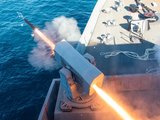Taiwan stresses Central America ties with navy visit
A Taiwanese navy flotilla docked in Nicaragua on 9 April in a high-profile visit highlighting ties with Central America and the Caribbean that are shrinking as China presses countries in the region to drop diplomatic relations.
The three vessels – described as being on a training mission – powered into Corinto, a port town on Nicaragua's Pacific coast, in a visit ‘to strengthen the ties of friendship,’ Nicaraguan officials and Taiwanese diplomats said.
Some of the 800 crew members who disembarked put on a Taekwondo martial arts display after an inspection by Nicaraguan military brass.
The warships were Pan Shi, a fast combat support ship, Pan Chao, an older, US-designed frigate, and Kuen Wing, a more recent, French-made stealth frigate.
They were to stay in port for three days, with the crew of officers, sailors and cadets participating with the Nicaraguan military in joint training activities, the Taiwanese embassy said.
It was the sixth time Taiwan has sent a ‘friendship flotilla’ to Nicaragua.
After Nicaragua, Taiwan's navy ships were to go on to make stops in the Marshall Islands, El Salvador, Honduras, Guatemala and the Dominican Republic.
Taiwan is gradually running out of ports of call as China – which considers Taiwan a renegade province that will one day be brought back under Beijing's control – presses countries to drop relations with Taipei.
Half the countries with which Taiwan has bilateral diplomatic relations are in Latin America and the Caribbean. And it is slowly losing ground there.
In June 2017, Panama cut ties with Taiwan to open relations with China instead. Costa Rica did likewise in 2007.
The parts of Latin America that still have ties with Taiwan are the Central American countries of Belize, El Salvador, Guatemala, Honduras and Nicaragua; the Caribbean states of Haiti, St Kitts and Nevis, St Vincent and the Grenadines, the Dominican Republic, and Santa Lucia; and the South American nation of Paraguay.
Across the region, China's increased investment and a more assertive foreign policy are being felt both economically and politically.
That trend has unsettled the US, which views the Chinese interest as encroachment in a region that it once regarded as its backyard.
US President Donald Trump is to attend a summit of leaders across the Americas in Peru on 13 and 14 April.
White House officials said part of his focus would be on pushing back against ‘external economic aggression,’ taken to mean China's growing investment in the region.
More from Defence Notes
-
![Singapore Airshow 2026: ST Engineering hints at export success for AME assault rifle family]()
Singapore Airshow 2026: ST Engineering hints at export success for AME assault rifle family
The Singapore-based technology company unveiled its new rifle family at this week’s airshow. Chen Chuanren spoke with the ST Engineering’s head of small arms to find out more about how the weapons have been refined.
-
![High tension in the High North – a wake-up call for NATO’s future Arctic defence efforts?]()
High tension in the High North – a wake-up call for NATO’s future Arctic defence efforts?
Any potential ‘Arctic Sentry’ mission would be months in the planning, but with tensions high in the region given the US’s push for Greenland, NATO countries will need to continue to emphasise their commitment to the region, analysts have said.
-
![Venezuela prepares personnel and equipment for a potential second US attack]()
Venezuela prepares personnel and equipment for a potential second US attack
Defence Minister Gen Vladimir Padrino López has declared that the Venezuelan armed forces “will continue to employ all its available capabilities for military defence”.
-
![As the new year starts, the UK defence spending delay continues]()
As the new year starts, the UK defence spending delay continues
The UK’s defence spending commitments remain uncertain as the government’s Defence Investment Plan, which had been due by the end of 2025, is yet to be published.
-
![How might European countries look to tackle drone incursions?]()
How might European countries look to tackle drone incursions?
Disruption of infrastructure in Europe, whether by cyberattack, physical damage to pipelines or uncrewed aerial vehicles flying over major airports, as has happened more recently, is on the rise. What is the most effective way of countering the aerial aspect of this not-so-open warfare?

























